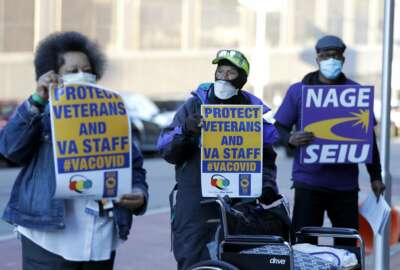To listen to the Federal Newscast on your phone or mobile device, subscribe in PodcastOne or Apple Podcasts. The best listening experience on desktop can be found using Chrome, Firefox or Safari.
- House and Senate Democrats pushed back on reports that the Trump Organization sought to reduce its rent on the Trump Hotel in Washington, D.C., during the coronavirus pandemic. Sen. Chris Van Hollen (D-Md.) has asked the General Services Administration how many of its tenants have asked to pay less rent since the pandemic began and the agency’s policy on modifying an existing lease. This comes after House Oversight and Reform Committee Chairwoman Carolyn Maloney (D-N.Y.) and government operations subcommittee chairman Gerry Connolly (D-Va.) urged GSA not to reduce the Trump Hotel’s rent.
- Top leaders in the National Capital Region are urging the Trump administration to keep existing telework policies in place while they’re trying to contain the pandemic. Maryland Gov. Larry Hogan, Virginia Gov. Ralph Northam and D.C. Mayor Muriel Bowser warned the administration against reopening federal offices too early. They say they trust the administration to implement telework policies that match their operating postures. The administration released guidance earlier this week instructing agencies to start thinking about their reopening plans in tandem with state decisions. (Federal News Network)
- Leaders of the House and Senate Small Business Committees asked the Small Business Administration to shed more light on reports of a data breach, in which SBA exposed personally identified information of nearly 8,000 businesses that applied for Economic Injury Disaster Loans. The lawmakers asked SBA to explain how the breach occurred, the number of individuals affected, and when the agency first notified those affected. (Sen. Marco Rubio)
- A new survey shows how hard small defense businesses are being hit by coronavirus. A report from the National Industrial Defense Association finds revenue expectations, meeting contract obligations and access to capital are the biggest issues for small defense businesses. Sixty percent of the 770 businesses surveyed said the COVID-19 crisis interfered with their cash flow because of cuts to billable hours and delayed payments. The survey also found that the technology and services sectors are taking a larger brunt of the economic slump than the manufacturing sector.
- The Census Bureau launched a COVID-19 Data Hub to help agencies, businesses and community leaders make data-driven decisions during the pandemic. The platform pulls data from the bureau’s American Community Survey and its County Business Patterns program, and includes population demographics, economic indicators and business data. The bureau has released similar dashboards during natural disasters. The COVID-19 Data Hub includes population demographics, economic indicators and business data. The bureau has launched a beta version of the data hub, but will update the platform based on user feedback.
- The National Archives and Records Administration gives federal employees a heads-up about keeping records while teleworking. NARA reminded employees who use their personal email accounts for official business must copy their dot-gov email account, or forward those message within 20 days. Agencies that use video conferencing platforms should still keep record of those meetings as if they were happening in-person.
- The Air Force is preparing to implement the new tenant bill of rights by issuing policy on what information airmen will get when they move into new homes. The guidance also sets new reporting requirements for companies that own privatized military housing. The bill of rights is a response to reports of mice, mold and lead paint in privately-owned military homes.
- The Air Force Reserve mobilized another 150 medical professionals to help with the fight against COVID-19 in the New York City area. The latest augmentees are all volunteers. Most are nurses and medical technicians, and come from 18 different Air Force Reserve units around the country. Officials said they’ll be assigned to help with medical needs in New Jersey, New York and Connecticut. The deployment ads to the 2,500 Defense Department personnel who are already delivering medical support in the area. Nationwide, the department says there are more than 54,000 military personnel directly involved in domestic COVID response and relief efforts, most of them from the National Guard.
- About 1,900 employees at the Veterans Health Administration have been diagnosed with coronavirus. That total up by 300 cases from the previous week. 20 VA employees have died from complications due to coronavirus. VA says employees with COVID-19 make up less than one percent of its workforce. The department says it’s a sign their health and safety precautions for employees are working. But a group of Senate Democrats say they’re still hearing about shortages of personal protective equipment at VA facilities. (Federal News Network)
- The Army completes the first round of a challenge contest in what might be record time. The challenge, launched April 5, seeks cheap, easily made deployable medical ventilators that work in austere environments. Yesterday the Army’s x-Tech judges picked two companies to get $100,000 prizes for their innovative designs. That followed eight pitches by 150 initial contestants. Spiro Devices proposed a breathing bag solution, AirMid Critical Care Products a bellows. Next they develop the ideas to where they can make ten thousand devices in eight weeks.
- Forty federal, state and local government and industry technology projects are finalists for the Igniting Innovation award. ACT-IAC released the list of contenders out of 140 nominations for one of eight recognition given to programs that try to improve services to citizens and government operations. This is the seventh year of the awards ceremony. ACT-IAC will announce the winners on Aug. 3 in Washington, D.C.
- The Government Accountability Office did not have many positive things to say about the Trump administration’s plans to merge the Office of Personnel Management with the General Services Administration. GAO reviewed a handful of the reorganization initiatives from the Trump administration. OPM never articulated the benefits, costs and alternative options for merging with GSA. Early attempts to engage OPM employees in reorganization efforts were insufficient. And GAO said OPM didn’t share all the details about the reorg with its employees. Moving the National Background Investigations Bureau from OPM to the Pentagon got better marks from GAO.
- GAO said the Interior Department violated the Antideficiency Act last year when it used user fees to keep national parks open during the government shutdown – and then violated it again by refusing to notify Congress it had done so. Interior disagreed with GAO’s finding that the reopening of parks was illegal. But in a letter to senior lawmakers, GAO said the department should have explained that in its own Congressional notification, instead of ignoring GAO’s findings altogether.
- A long-time CIO steps into an additional leadership role. David Shive, the General Services Administration’s CIO, is the new vice chairman of the CIO Council. The council named Shive to this new, additional role earlier this week. Shive replaces Joe Klimavicz, who retired from federal service in February. Along with being GSA’s CIO for five years, Shive also was the co-chairman of the council’s Services, Strategy and Infrastructure Committee. As vice chairman, Shive will provide on the ground feedback and insights about how policies and initiatives could impact agencies.
Copyright
© 2025 Federal News Network. All rights reserved. This website is not intended for users located within the European Economic Area.



